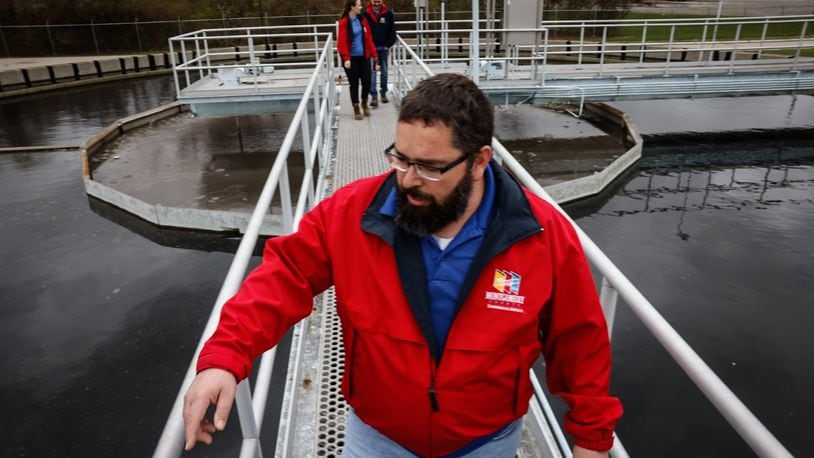Eastern plant water reclamation manager Donnie Hartman said Montgomery County staff help maintain thousands of miles of sewer lines and they say removal of oils and grease can be challenging and costly.
Montgomery County’s Eastern and Western Wastewater Treatment Facilities process anything that goes down drains or pipes in parts of Montgomery and Greene counties, working to treat water before it’s discharged back into the Little Miami watershed.
Hartman’s plant serves many people living in Kettering, portions of Beavercreek, Dayton and Oakwood.
The past few Easter seasons have been busy for water treatment employees.
Credit: JIM NOELKER
Credit: JIM NOELKER
This year, the county spent $5,000 for two 35-gallon drums of a chemical that separates grease from county water as a result of grease build-up likely from the spring fish fry season.
Burdensome, too, is the time and labor put into resolving maintenance issues at both plants and unclogging the public side of sewer lines, Hartman said.
When cooking grease is sent down pipes, it solidifies after it cools and clings to the top of a pipe’s interior. Some grease will also adhere to bits of sediment that travel through the water system, creating large grease clusters that stick to water treatment facility equipment in different stages of the treatment process.
“These are the things that should be going to the landfill from your home, not to the landfill from here,” Hartman said.
The county’s two plants treat approximately 35 million gallons of sewage every day. Wastewater workers maintain thousands of miles of sewer lines, which makes maintenance and removal of oils and grease more challenging, he said.
But people should be aware of grease build-up year-round. Grease can take years to build up in pipes before you might see it become a problem, according to Hartman.
Cooking grease should not be poured down any drain. Rather, it should be poured into an aluminum can, solidified, and then thrown away in a regular trash can.
Residents can also pour grease into aluminum foil if a can is not available, but they should never pour grease into a material that can melt with heat, Hartman said.
Larger quantities of grease can be taken to the county’s Household Hazardous Waste drop off events from 1-7 p.m. every Tuesday from March through October at the Solid Waste District’s Recycling Canopy, located at 1001 Encrete Lane in Moraine.
About the Author
